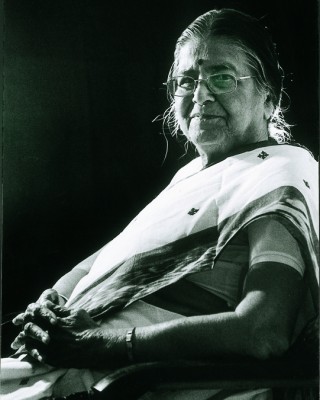
With passing away of Mrinal Gore, an era of idealism, struggles against injustice and selfless social service ends
By Vibhuti Patel
Women’s rights activist and veteran socialist leader, who combined her crusade for social justice and distributive justice for more than five decades, passed away on 17th July, 2012 in Mumbai.
Hundreds of women and men from different walks of life – social and political workers, women’s rights activists, trade unionists, teachers, nurses, and community workers, for whose causes and day to day survival struggles she had strived for all her life, participated in the funeral procession.
Even powerful politicians whom she had campaigned against during the anti price rise movement had nothing but words of admiration and appreciation for her simple, transparent, spartan life and unflinching dedication to her mission of serving the poor and the marginalised sections of society.
She brought the issue of safe drinking water centre stage during 1960s. In 1964, she stormed into the BrihanMumbai Municipal Corporation (BMC) offices and tore up the ballot papers after 11 people were killed in water riots in the slums. The municipal law that did not permit water connections to the slums was rectified. She is remembered by three generations of Mumbaikars as the “Paaniwali Bai” (a woman who got the water).
It was Mrinaltai i.e. “an elder sister” (as she was popularly addressed), who as an MLA in 1972, moved a resolution for the Slum Improvement Act (till then there was only the Slum Eradication Act). That landmark resolution was debated from 11.00 a.m. to 6 a.m. the next day before being passed. Mrinaltai used to tell us, “For the first time the assembly worked night and day,”
Mrinaltai and her husband Keshav Gore had impeccable socialist credentials. Jayaprakash Narayan was a witness at their wedding. After the death of Keshavji at a young age in 1958, Mrinaltai immortalised him by not only founding the Keshav Gore Trust but also making it an epicenter of all progressive, socialist and social movement activities, programmes and gatherings. Local, state level and national level progressive thinking stalwarts and change makers from different spheres-politics, tribal arts, writers, literature, feminists and environmentalists thronged the Trust.
Mrinaltai was influenced by Mahatma Gandhi’s Quit India movement as a young medical student. She gave up a promising career in medicine to plunge full time into organising the poor and the marginalised. For more than half a century and till her death, she had been involved with a series of organisations and leading protests both on the streets and in the corridors of power, focusing on women’s rights, dalit rights and civil rights such as water, housing, sanitation, education and health services, environmental concerns, communal harmony and trade union activities. Through camps, workshops, cultural programmes of Rashtriya Seva Dal, she groomed thousands of young minds to serve the society.
She was a woman of vision, ideas and praxis and a gifted and electrifying orator. At the same time she was warm and hospitable. She followed an open door policy, listened to everyone patiently and adopted best practices wherever she noticed. She is one public figure whom I never saw basking in the past glory. Instead she was eager to learn from the youngsters. Her speeches served as tonic to young activists like us in the 1970s and 1980s. My association with her began in 1972 when she visited Vadodara to do her homework to launch the campaign against price rise, black marketing and hoarding of essential goods by traders and ration shop owners.
In 1972, Gore contested the Maharashtra Assembly elections on the Socialist Party ticket and won with the highest margin in the state. As a firebrand MLA, she took up issues such as atrocities on marginal farmers, Dalits, tribal people and women. She always did her homework carefully and commissioned research, organized study circles, developed a library and documentation centre, prepared charts and exhibition for public education.
After the prices of essential commodities began skyrocketing, in September 1972, Gore was at the forefront in setting up the Anti-Price Rise Committee which mobilized the largest-ever turnout of women since the Independence movement.
During the Emergency rule, she was arrested and shifted from one jail to the other for 18 months and was kept in the prison cell along with murderers, lunatics and hardcore criminals. Once released in 1977, Mrinaltai was elected to Parliament on Janata Party ticket with the central slogan “Democracy versus dictatorship”. In 1985, she became an MLA again and took up the issue of banning sex determination tests in the legislative assembly resulting in Maharashtra being the first state in India to pass the Pre Natal Diagnostic Techniques Act in 1988. During her hectic days as MLA, she would call me and Ravindra R.P. at 7 a.m. to discuss position of Forum Against Sex Selection on technical aspects of amniocentesis, ChorionicVillus biopsy and sex pre selection techniques. She always made flawless and full proof statements as a public figure.
She also led protests against the entry of US giant Enron in the power sector, fought against slum demolition and supported people displaced by the Narmada Dam and slum eviction drive of Bombay Municipal Corporation.
The demise of this veteran leader and champion of people’s struggles has created massive void in the social movements and struggles for human rights.
Related articles
- Veteran social activist Mrinal Gore passes away (thehindu.com)
- ‘Paaniwali bai’ had great love for people, passion for causes (thehindu.com)
- Hundreds bid adieu to Mrinal Gore (thehindu.com)
Leave a Reply